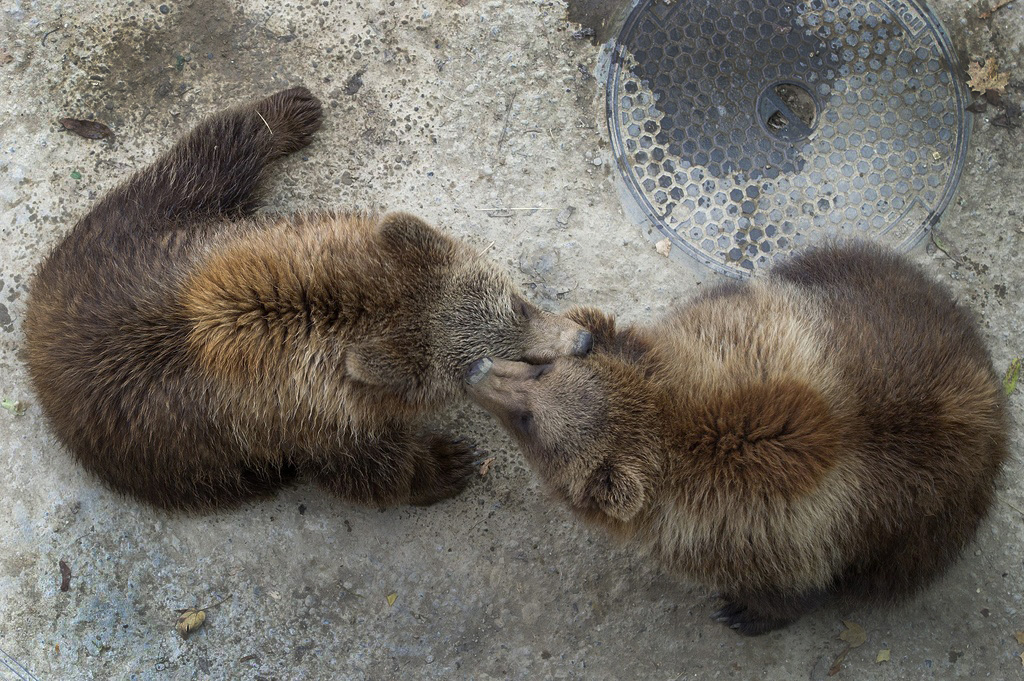
Bear family to stay united

In a new twist to the saga of Bern’s bear cubs it was revealed this week that they are not going to Romania, as anticipated – or anywhere else.
They will remain in the place where they were born, sharing the bear park not only with their mother, Björk, as they have done up to now, but also with their father, Finn, who for nearly two years now has been divided from them by a high wire fence.
The announcement by zoo director Bernd Schildger followed recent reports in the local media that plans to take Ursina and Berna, as they are called, to the Zarneşti sanctuary in Romania had fallen through – and much speculation about the reasons.
While praising the work done at Zarneşti, he told journalists that it had become clear “after a lot of phoning backwards and forwards” that the plan was “too difficult”, and his team had been forced to look for other solutions.
New concept
This is where Canadian bear expert Else Poulsen came in.
She looked at the conditions in the park and the behaviour of the four bears living there and came to a conclusion that went against the previously well-publicised idea that mother bears always push their young out when they are about 18 months old – the reason why Berna and Ursina would need a new home.
“Contrary to widely held belief, bears are very social,” Poulsen told the 20 Minutes free newspaper.
“And then in the several days I spent visiting Bern, I observed Björk’s very calm and controlled behaviour,” she added.
She said the family would be brought together gradually after the hibernation period.
But it is not simply a matter of opening the fence and letting Finn join his family and presuming everyone will live happily ever after, Schildger said.
There are certain steps that have to be taken first, to make the park a suitable shared home.
“It must be made clear to Björk that Finn must not eat the cubs. It must be clear to all the bears that at all times and in all places there is enough food and enough places to sleep and that they don’t need to compete with each other,” Schildger explained.
“That’s the most important thing for bears.”
What is also of great importance is that Finn shouldn’t mate with his daughters.
He will be sterilised – which is not at all the same thing as being castrated, Schildger stressed.
Castration would change his natural behaviour; sterilisation won’t.
But that means that there won’t be any more bear cubs – it’s a price that has to be paid for this solution.
The Bern tourist authorities are looking on the bright side. Although it is a pity there will be no cubs for the foreseeable future “locals and tourists will be able to watch the family develop,” tourism director Michael Keller told the Blick newspaper.
Star attraction
The cubs have been a major tourist draw ever since Björk allowed them to emerge from the den where they were born. Their play fights, their tumbles, their wobbly attempts to climb the saplings in the park, have been followed and photographed by visitors from all over the world.
Their future has aroused passionate debate – not least among readers of swissinfo.ch – ever since Schildger was quoted in August 2010 as saying that if no suitable home was found for them they could even be put to sleep because Björk would eventually reject them.
Schildger and his team were very happy with the idea of sending them to Zarneşti whose prime purpose is to provide a home for some of the many bears mistreated in Romania.
He was tactful about why the plan failed – “we’re not here to blame anyone,” he said – and he stressed that the reserve was a “great place”, that does a “super job”, and the bear park would continue to work with it.
A contract has now been drawn up with Poulsen, who will work with the park to implement the new idea.
Asked whether there was any risk that it might not work, Schildger said he couldn’t exclude it – bears are highly complex animals and do not obey simple formulae.
As for the cost, he estimated it at about SFr30,000 – while admitting that estimates are rarely accurate. That includes the contract with Poulsen, and the new facilities to be added to the park to give the bears new things to do. The same sum had been budgeted for the transfer of Berna and Ursina to Romania.
Whose bears?
The park will become less of an international draw without young animals, but Schildger has rejected the suggestion that it should become a sort of “bear exchange”, taking in a succession of cubs and sending them back where they came from when they get older.
Instead, the focus will be more local.
Bern will have its own family of four animals, summed up in the slogan: “Give to the Bernese what belongs to them: their bears.”
There are currently four European brown bears in Bern’s bear park.
Björk, the female, is the oldest. She was born in Denmark in 2000 and came to Bern in 2004.
Finn, the male, was born in Finland in 2006, and came to Bern in 2008.
Both originally lived in the Dählhölzli zoo, waiting for the new bear park to be completed.
They were transferred to the park in October 2009, at which time Björk was already pregnant.
She gave birth to two female cubs, Berna and Ursina, in December 2009.
Despite the fact that they were her first offspring, and she had recently suffered the stress of moving, she turned out to be an excellent mother.
Inexperienced she-bears, especially if they feel stress, often kill their young.
It was originally thought that Ursina was male; her sex was not determined until 2010.
Bears have a long association with Bern. According to legend, the founder of Bern, Berchtold V von Zähringen, named his new city after the first animal he killed in a hunt near the site of the bear pit.
It was a bear – or Bär in German. This is why the city’s coat of arms features a bear. Bears have been kept in Bern for around 500 years.
There are a number of bear statues all over the city, including on several of the 16th-century fountains.
“Persons of all ages and of all ranks are never weary of gazing at the animals, and hang over the wall in fond delight; the opulent sometimes spend a halfpenny in pears or gingerbread to throw to the bears…
If the bears catch a piece of gingerbread in their paws, the happiness of the spectator is complete. This is the only notion a Bernois can form of pleasure.”

In compliance with the JTI standards
More: SWI swissinfo.ch certified by the Journalism Trust Initiative




























You can find an overview of ongoing debates with our journalists here . Please join us!
If you want to start a conversation about a topic raised in this article or want to report factual errors, email us at english@swissinfo.ch.